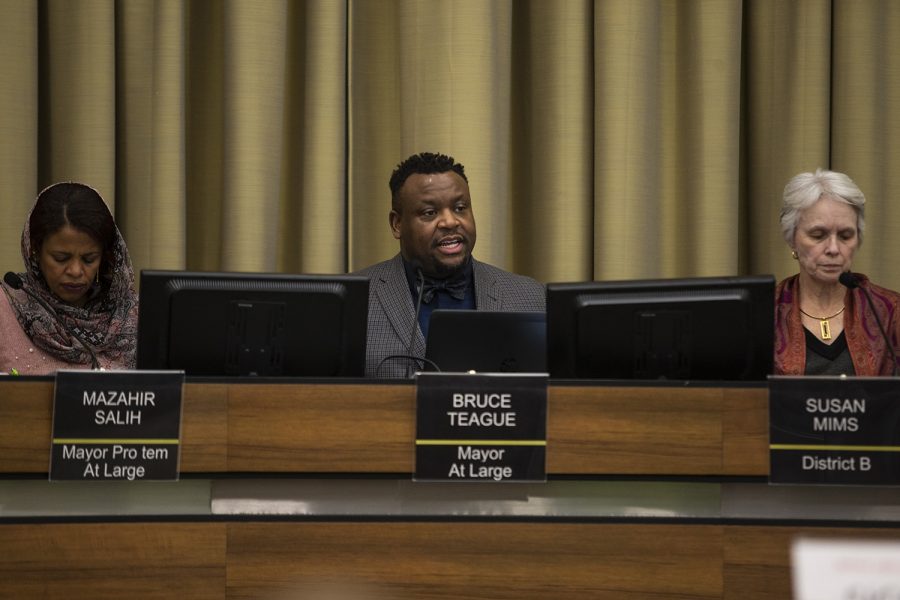City Council passes resolution addressing Iowa Freedom Riders’ demands
After an over four-hour discussion, a city resolution adopting community demands in response to police misconduct has passed.
Iowa City Mayor Bruce Teague addresses the crowd at an Iowa City City Council meeting on Tuesday, Feb. 18, 2020.
June 17, 2020
In response to the demands of the Iowa Freedom Riders, the Iowa City City Council passed a resolution that will allow for more city involvement in reviewing police procedures and city policies on Tuesday, despite disagreement over the written language of the demands.
The adopted resolution included a multi-step review process of the police department, a moratorium on the use of violent dispersion tactics against protesters, and a recommendation to drop all charges connected to the protests.
City Councilor Laura Bergus drafted the resolution and presented it to the city council during a special session Tuesday night.
City staff will need time to adopt the language changes into the resolution, effective Wednesday, City Attorney Eleanor Dilkes said.
Protests against the death of George Floyd, a Black man who was killed when former Minneapolis police officer Derek Chauvin knelt on his neck for over 8 minutes, began in Iowa City on June 1. The Iowa Freedom Riders, a group that has been organizing weeks of protests throughout Iowa City, presented their demands to the city council on June 9.
City councilors disagreed on the severity of the language in the group’s demands. Mayor Pro Tem Mazahir Salih said it was necessary to use strong language when addressing the city council’s plans to adhere to the Iowa Freedom Riders’ demands.
“There is no better time than now for us to act,” she said. “The language should be there.”
RELATED: Iowa City Freedom Riders introduce new demands at second week of protests
Some of the most debated items on the list included the city’s level of commitment to racial equity and social justice, a request for a report on military-grade equipment used by the Iowa City Police Department, and disciplinary action against police officers who do not use body cameras and in-car recorders.
City Councilors Pauline Taylor and Susan Mims suggested that the council should state it would implement diversity and inclusion throughout a city staff member’s entire employment, instead of explicitly addressing the demand for at least 30 percent of staff devoted to diversity and inclusion.
Salih said the city was lagging on implementing diversity in its various departments, and that adding 30 percent as a specific goal would hold the city council accountable to following through with the Iowa Freedom Riders’ demands.
Taylor said she would like the police department to provide an inventory of all military-grade equipment in the Iowa City Police Department, whether or not it is in use.
Mayor Bruce Teague agreed with Taylor and stated that the city should know what is in its toolbox. Placing a moratorium on using rubber bullets, tear gas, and flash-bangs against protesters would best address the protesters’ demands, he said.
Salih said she wanted to see more detail in the resolution’s items and severe consequences must take place if an officer refuses to comply with the written resolution.
“Right now, Black lives matter,” she said. “[These demands] will ensure that if we have an officer who is not following this, we need to have a strong termination policy in place.”
RELATED: Iowa City City Council discusses Iowa Freedom Riders’ demands for policy change
Mims said that she did not agree with placing a moratorium on these dispersion tactics, because potential situations involving threats against the city could call for the use of these agents.
“If white supremacists attack the Pedestrian mall, having this moratorium might prevent the police department from protecting the city,” Mims said. “We should get explanations as to why [Iowa City police] believe they should keep them if they voice the need for them.”
The resolution also addressed expanding powers of the Community Police Review Board, by allowing the board to select an attorney of its choosing, instead of the city appointing one to it.
Dilkes told The Daily Iowan previously that further expansion of powers for the Community Police Review Board would require change at a statewide level, due to Iowa’s civil-services provisions.
Salih said she was frustrated that some of the city councilors were more focused on potential scenarios that would require less severe changes than dealing with the problems at hand.
“The reason we are here discussing these demands is because the Iowa City Police Department attacked peaceful protesters,” Salih said. “Yes, if someone comes and attacks Iowa City, then we can address the use of those agents. But right now, the scenario in front of us is dealing with the attack on peaceful protesters. Just because they make you uncomfortable, does not mean that they are dangerous.”





